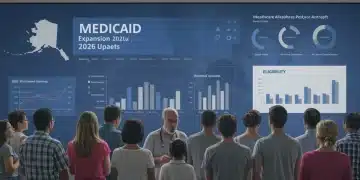Student loan forgiveness extension: what you need to know

Student loan forgiveness extends options for qualifying borrowers to reduce or eliminate their student debt, depending on specific eligibility criteria and program requirements.
Student loan forgiveness extension is in the spotlight, impacting countless borrowers. Have you made sense of what this means for your future repayments? Let’s break it down together.
What is student loan forgiveness?
Student loan forgiveness is a program designed to help borrowers reduce or eliminate their student loan debt. Many people may wonder how it works and who qualifies for it. Essentially, this type of forgiveness can significantly ease the financial burden for those who have struggled to repay their loans.
There are several types of student loan forgiveness programs available, each with unique eligibility criteria. These options provide relief for borrowers based on specific circumstances, such as employment in public service or teaching, and are aimed at making higher education more accessible. Public Service Loan Forgiveness (PSLF) is one of the most well-known programs.
Types of student loan forgiveness
Borrowers can explore various options to determine the most suitable for them:
- Public Service Loan Forgiveness (PSLF): For those employed in qualifying public service jobs.
- Teacher Loan Forgiveness: Designed for teachers who work in low-income schools.
- Total and Permanent Disability Discharge: For borrowers who are unable to work due to a disability.
- Income-Driven Repayment Forgiveness: Forgiveness after a certain repayment period based on income.
Beyond these major programs, there are also state-specific or institution-based forgiveness options available. It’s essential to research and understand what you might qualify for.
Staying informed about the guidelines and requirements is crucial. For example, borrowers interested in PSLF should ensure they are enrolled in a qualifying repayment plan and are making the necessary number of qualifying payments. Regularly checking your servicer’s website can also provide updates on any changes or new programs.
Many borrowers may feel overwhelmed by this process, but taking the time to explore student loan forgiveness options can lead to substantial financial relief. Understanding the requirements and application process is key to successfully navigating this landscape.
Eligibility criteria for loan forgiveness
Determining if you qualify for loan forgiveness is crucial for many borrowers. Understanding the specific eligibility criteria can help you navigate your options effectively. Many factors contribute to whether you might be eligible.
Generally, the eligibility for student loan forgiveness varies depending on the program. Different programs have different requirements, so it’s essential to understand what they entail. Some common programs, like Public Service Loan Forgiveness (PSLF), focus heavily on your employment. Let’s explore this further.
Common eligibility criteria
Here are some of the typical criteria for different loan forgiveness programs:
- Employment type: Many programs require you to work in public service, teaching, or other qualifying jobs.
- Payment history: You usually need to have made a certain number of qualifying payments on your loans.
- Loan type: Not all loans qualify; for example, Federal Direct Loans are often eligible, while private loans are not.
- Repayment plan: Programs may require you to be enrolled in a specific repayment plan to qualify.
For example, to qualify for PSLF, you must work full-time for a qualifying employer and make 120 qualifying monthly payments under a qualifying repayment plan. This means that your job stability and the repayment plan you choose are both essential components of your eligibility.
Furthermore, special circumstances such as total and permanent disability can also qualify you for discharge. Understanding these conditions can open more doors than expected.
Finally, it’s important to keep track of any changes in the policies surrounding loan forgiveness. Program requirements can evolve, so staying informed will help you take full advantage of your options.
Key dates for the student loan forgiveness extension

Understanding the key dates for the student loan forgiveness extension is crucial for borrowers. These dates can impact your eligibility and repayment plans, making it important to stay informed. Knowing when to act can help you take full advantage of the program and avoid missing opportunities.
The timeline for loan forgiveness can vary based on the specific program you are looking into. For instance, there might be a new application window or changes in policies that affect your loans. Keeping track of these dates will allow you to stay ahead.
Important deadlines to remember
Here are some critical dates that borrowers should keep in mind:
- Application opening and closing dates: Be sure to check when applications for forgiveness begin and when they end to avoid missing your chance.
- Payment deadlines: Keep track of when your regular loan payments are due, especially if you are nearing the end of the suspension period.
- Updates on policy changes: Changes to loan policies may be announced on specific dates, so stay engaged with relevant news sources.
- Eligibility reviews: Your loans may be periodically reviewed for eligibility based on new guidelines.
As these dates approach, consider setting reminders to ensure you complete necessary tasks on time. Staying proactive about your loans can lead to more favorable outcomes. Reach out to your loan servicer to clarify any uncertainties surrounding these *key dates*.
Remember, better awareness can help ease your financial stress. Continuously checking for updates regarding the student loan forgiveness extension will empower you and keep you in the loop.
Benefits of the forgiveness program
The benefits of the forgiveness program are numerous and can make a significant impact on borrowers’ lives. Understanding these advantages can help individuals weigh their options regarding student loans. By choosing to apply for a forgiveness program, borrowers can alleviate some of their financial burdens.
One of the most immediate benefits is the potential for a reduced financial obligation. Many borrowers may find their monthly payments less stressful and achievable. Reducing or eliminating the amount owed allows individuals to redirect their finances toward savings or essential living expenses. Additionally, borrowers who qualify for forgiveness can often focus more on their careers without the constant pressure of student debt.
Key advantages of forgiveness programs
Here are some key benefits associated with these programs:
- Financial relief: Many borrowers see reductions in their total loan balance after participating in these programs.
- Career flexibility: With less financial burden, individuals may pursue jobs in fields they are passionate about, particularly in public service roles that qualify for forgiveness.
- Improved credit scores: Eliminating or reducing debt can lead to better credit scores, enhancing future borrowing capabilities.
- Peace of mind: Knowing that loans may be forgiven can reduce stress and anxiety regarding financial futures.
Moreover, participating in these programs can empower borrowers to make decisions that align with their life goals. It enables people to think long-term about their careers and family planning rather than merely focusing on making monthly payments. Ultimately, understanding the benefits of the forgiveness program encourages many to seek out the right path for their financial future.
It’s important to actively engage with loan servicers and remain informed about potential changes in policies that could affect your eligibility or benefits in these programs. This awareness ensures that borrowers can continue to enjoy the benefits that these forgiveness programs offer.
Common questions about the process
Many borrowers have common questions about the student loan forgiveness process. Understanding these questions can help clarify how the programs work and what is required. Knowing what to expect enables individuals to prepare better and make informed decisions.
One frequent question concerns the eligibility requirements. Borrowers often want to know if they qualify for forgiveness based on their jobs or payment history. It’s essential to review specific program criteria and stay updated on changes that may affect eligibility. Another common inquiry is about the timeline for processing applications and when borrowers might see their loans forgiven.
Frequently asked questions
Here are some of the most common questions regarding the forgiveness process:
- How long does the forgiveness application process take? The timeline can vary, but many borrowers report waiting a few months for updates after submitting applications.
- What happens if my application is denied? If your application is denied, you typically receive information on why and instructions on how to appeal the decision.
- Are there any fees associated with applying for forgiveness? Legitimate loan forgiveness programs do not charge fees, so be cautious of scams that may try to collect money upfront.
- Can I still apply if I have defaulted on my loans? In many cases, borrowers must bring their loans out of default before applying for forgiveness.
In addition to these questions, many borrowers seek advice on the best ways to navigate the complexities of the forgiveness landscape. Having reliable information makes it easier to follow the necessary steps and ensure that nothing is overlooked.
It’s a good idea to consult with your loan servicer and utilize online resources to get clear answers to any lingering questions about the process. By staying informed, you can enhance your understanding and improve your chances of successfully obtaining loan forgiveness.
In conclusion, understanding the student loan forgiveness process is essential for any borrower. By knowing the eligibility criteria, key dates, and benefits of forgiveness, individuals can make informed decisions about their financial futures. Additionally, being aware of common questions surrounding the process can equip borrowers with the knowledge needed to navigate their loan journeys effectively. Remember, taking proactive steps and staying informed can lead to significant financial relief. Always consult with your loan servicer for assistance and updates on your specific situation.
\n\n
\n
FAQ – Frequently Asked Questions about Student Loan Forgiveness
What is student loan forgiveness?
Student loan forgiveness is a program that helps borrowers reduce or eliminate their outstanding student loan debt.
Who is eligible for forgiveness programs?
Eligibility varies by program but often requires employment in public service or a specific career path.
How do I apply for student loan forgiveness?
You typically need to fill out an application specific to the forgiveness program you are seeking and submit it to your loan servicer.
What should I do if my application is denied?
If denied, review the reason for denial, and you may appeal or take steps to address the issues noted.





